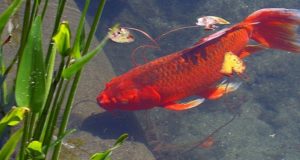Hi, everyone. Jose here. Ever wonder why some people keep certain species of fish over others? Some people like to keep Oscars and Jack Dempseys because they eat other fish, others keep African Cichlids for their colors. Some choose bloody parrots because they are “cute” (hahaha, sorry), yet others of you have angels and rams for their elegant fins and coloration.
My reason for being a “cichlidiot” (cichlid idiot) at first was their color. I started out Mbuna from Lake Malawi. I got a 55 gallon, a bunch of rocks and plants, and kept Pseudos and yellow labs. Well, the plants got trashed, so it ended up being a tank full of rocks. Then I added the Electric blue Ahli  and a Bicolor Peacock (let the games begin). That poor peacock didn’t stand a chance between the Ahli and the Mbuna. Lessons learned along the way, my obsession with cichlids of all types and from all regions has contributed to a lot of fun and interesting aquarium adventures through the years. So, away with the pretty little Mbunas and onto Malawi haps, like the Eye-biter, the Livingstoni, etc. I went. Besides the outstanding colors, each species also had some very interesting feeding and breeding behavior that fueled my interest.
and a Bicolor Peacock (let the games begin). That poor peacock didn’t stand a chance between the Ahli and the Mbuna. Lessons learned along the way, my obsession with cichlids of all types and from all regions has contributed to a lot of fun and interesting aquarium adventures through the years. So, away with the pretty little Mbunas and onto Malawi haps, like the Eye-biter, the Livingstoni, etc. I went. Besides the outstanding colors, each species also had some very interesting feeding and breeding behavior that fueled my interest.
Next came the Victorians. These were smaller than the big guys I was used to, but with color and spunk, careful mixing of pairs (a lot of females look alike and you can end up with hybrids) my reason for these guys was the fact that they were almost wiped out due to the introduction of the Nile Perch to their native habitats. Keeping fish like these is a great way to keep species going.
Next for me were the Tanganyikans. The Brichardi complex with its long flowing fins got me hooked, then, I fell in love with Featherfins and Shell-dwellers. Tanganyika is a very diverse lake with multiple types of spawning rituals. You have egg layers, and mouth-brooders, and egg scattering species, all very interesting to breed and observe.
Then we have the West Africans. These colorful and interesting fish live in the rivers of West Africa, and include different types of Kribs, Jewel Cichlids, and not to forget, some of the tilapia species. After a few years, my madness moved on to South American Dwarf Cichlids and then the discus. Breeding them was an accomplishment.
Dwarf pikes and rams were next on my list, and the fun and headaches of keeping Central Americans soon followed. They are bruisers; big, mean and with a lot of attitude, and even smaller centrals think they are their larger cousins with plenty of attitude for their size.
Finally I ventured into fish from Madagascar (most of which are either extinct or in danger of being extinct), which were a treat to keep. They are a lot like the centrals in behavior and habitat conditions. And I can’t forget to mention the Chromides from Asia and the new cichlid they’ve found in Iran.
Now that I’ve outlined the path of my decent into cichlid madness, I’ll talk about my favorites from each location in some future installments.
Until next time
Jose
 That Fish Blog – Aquarium Advice and Information
That Fish Blog – Aquarium Advice and Information

